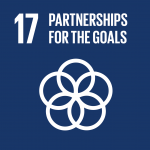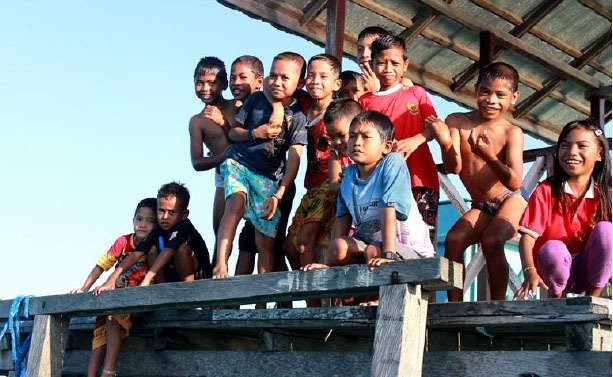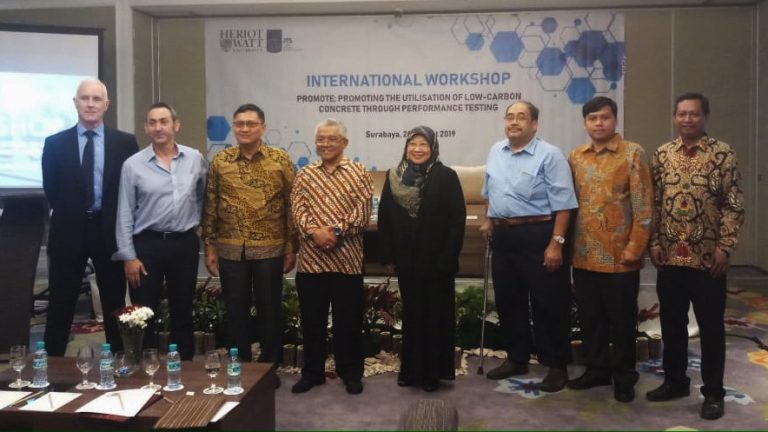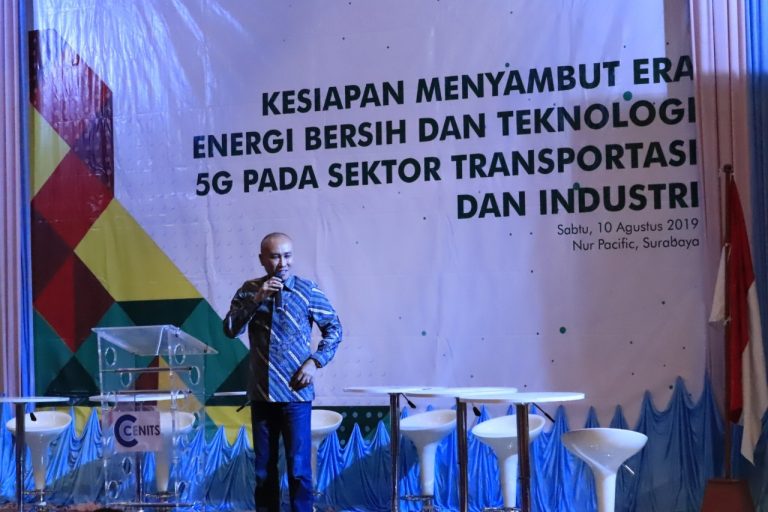“Sustainable development is the responsibility of every part of society, across the world. It cannot be achieved without linkages, across the goals, but also between institutions, governments, companies, NGOs, and people.”
(THE Impact Rankings)
SDG 17: PARTNERSHIP FOR THE GOALS
Relationships to Support the Goals
ITS Collaboration with BRIN and KLHK in SDGs Policies
Institut Teknologi Sepuluh Nopember (ITS) and the National Research and Innovation Agency (BRIN) are partnering to design policies supporting Indonesia’s Net-Zero Emission (NZE) target by 2060. In recent years, Indonesia has faced significant challenges in balancing economic growth with the need to reduce carbon emissions. Achieving the 2060 NZE target, as set by the government, requires well-crafted strategies and policies to address the socio-economic impacts of a clean energy transition.
This collaboration, held at the ITS campus, underscores the importance of policies that effectively address the economic and social impacts of the NZE transition. ITS and BRIN have partnered to create inclusive and effective policies, emphasizing the need for measures that address the socio-economic effects of the NZE transition. The collaboration also involves a broad range of stakeholders, including academics and practitioners, to ensure a comprehensive approach.
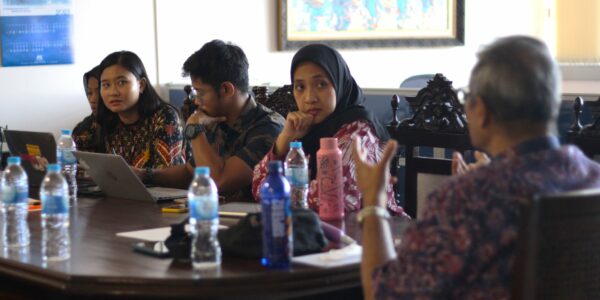
In addition, ITS also supports the Ministry of Environment and Forestry’s (KLHK) PROPER program, which focuses on implementing transparency and democracy in environmental management for companies. In collaboration with Olahkarsa, ITS organized the Ready for PROPER Conference 2023, highlighting the importance of PROPER as a benchmark for companies to achieve higher sustainability standards in their environmental practices.
Through PROPER, companies are assessed on their environmental management using a color-based ranking system that encourages compliance and even excellence beyond regulatory requirements. The strong interest from industries is evident in the growing number of PROPER participants, although some companies still fall short of the minimum standards. This conference underscores ITS’s partnership with the government to advance environmental transparency in the industrial sector as a strategic step towards Indonesia’s net-zero carbon target by 2060. Through PROPER, ITS plays a critical role in promoting greener industrial practices and helping industries meet the standard policy of higher environmental management.
Full article:
ITS Collaboration with BRIN in Net-Zero Emission 2060 Policy
ITS Hosts Collaboration Launch with IDSurvey and Engages Policymakers in Maritime Innovation Dialogue
ITS has taken a significant step toward sustainable maritime development through its partnership with IDSurvey, marked by the inauguration of a new collaboration space at the National Ship Design and Engineering Center (NaSDEC). The initiative represented a comprehensive approach on strengthening Indonesia’s maritime capabilities.
The strategic 15 x 15-meter facility, positioned alongside the Indonesian Shipbuilding and Offshore Industries Association (Iperindo) office, serves as a hub for transformative maritime innovation. During the inauguration, ITS Rector Prof. Dr. Ir. Mochamad Ashari MEng highlighted how this initiative bridges the crucial gap between academic innovation and industrial implementation on sustainable industrialization and innovation. The space aims to streamline certification and licensing procedures that have historically hindered the commercialization of promising maritime technologies.
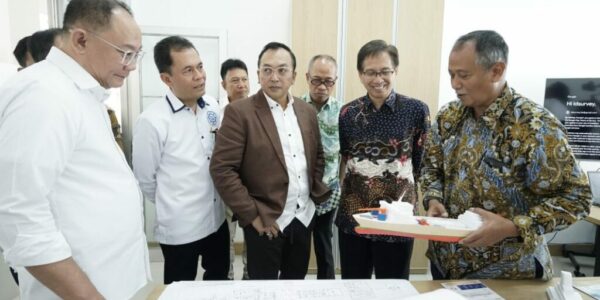
The event featured a significant dialogue between key stakeholders, including Capt. Heru Susanto MM from the Tanjung Perak Harbor Master and Port Authority Office (KSOP) and representatives from the Indonesian Classification Bureau (BKI). Their discussions emphasized the initiative’s alignment with Law No. 17 of 2008 concerning Maritime Affairs and its potential to reduce regional disparities by improving maritime access to Indonesia’s outermost, remote, and underdeveloped islands (3T).
The collaboration’s focus on Testing, Inspection, and Certification (TIC) services demonstrates a balanced approach to maritime development. By fostering local innovation and reducing dependency on foreign maritime products, the initiative strengthens Indonesia’s technological self-reliance while ensuring environmental sustainability. This integrated approach ensures that technological innovations not only meet commercial requirements but also contribute to Indonesia’s broader sustainable development objectives. The initiative stands as a model for future cross-sectoral collaborations, demonstrating how coordinated efforts between academic institutions and industry stakeholders can accelerate progress toward multiple SDGs while advancing national maritime interests.
INSPIRASI: A Global Hub for Research and Data on Sustainability Initiatives at ITS
The INSPIRASI Program represents a pioneering partnership between Nanyang Technological University (NTU) Singapore and four premier Indonesian universities – Institut Teknologi Sepuluh Nopember (ITS), Institut Teknologi Bandung (ITB), Universitas Indonesia (UI), and Universitas Gadjah Mada (UGM). This collaboration establishes a robust framework for sustainable development research and implementation, focusing specifically on SDG advancement through comprehensive data gathering and analysis.
The program’s foundation rests on three critical pillars: renewable energy, smart cities, and circular economy. This focused approach enables targeted research and data collection efforts that directly contribute to sustainable development in Southeast Asia. Through seven key collaborative mechanisms – joint research, publications, researcher exchanges, visiting professor programs, institute development, supervision, and student exchanges – INSPIRASI creates a comprehensive ecosystem for international academic cooperation.
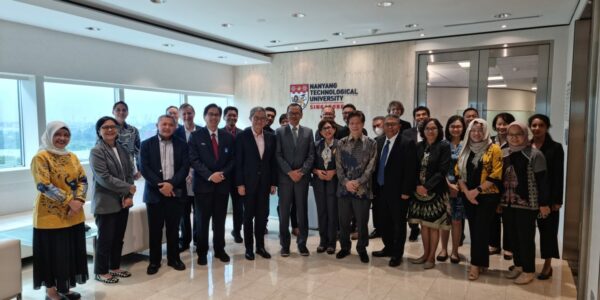
The data gathering framework implements standardized methodologies across all participating institutions, ensuring consistency and comparability in research outcomes. This standardization extends to knowledge integration practices, where cross-border data sharing and best practice documentation create a robust regional expertise network. The program emphasizes practical implementation, translating research findings into evidence-based policy recommendations and scalable solution frameworks for regional sustainability challenges.
INSPIRASI’s research infrastructure supports systematic collection and analysis of sustainability metrics, enabling meaningful comparative studies and impact assessments throughout Southeast Asia. The program develops standardized measurement tools and assessment protocols that can be applied across different regional contexts, ensuring consistency in data collection and analysis. This structured approach to research and data gathering positions INSPIRASI as a key contributor to regional sustainable development efforts.
International Partnerships and Research Excellence: ITS’ Global Initiatives for Sustainable Development
ITS led in fostering international collaboration for sustainable development through innovative coastal sustainability research and urban development initiatives, combining specialized expertise with strategic global partnerships to address pressing environmental and social challenges. At the forefront of coastal sustainability efforts, ITS’ Center for Marine and Earth Science and Technology Research (Puslit STKK) leads a transformative multi-center collaboration involving researchers from seven countries – Germany, Japan, Malaysia, Thailand, United Kingdom, Australia, and Indonesia. The 4th Sustainability and Resilience Coastal Management (SRCM) conference showcases this collaboration, uniting the Center for Sustainable Infrastructure and Environmental Research (PILB) and the Center for Disaster Mitigation Research and Climate Change (Puslit MKPI). With 20% international contribution, the initiative has successfully published findings in prestigious journals including IOP Conference Series and BIO Web Conferences.
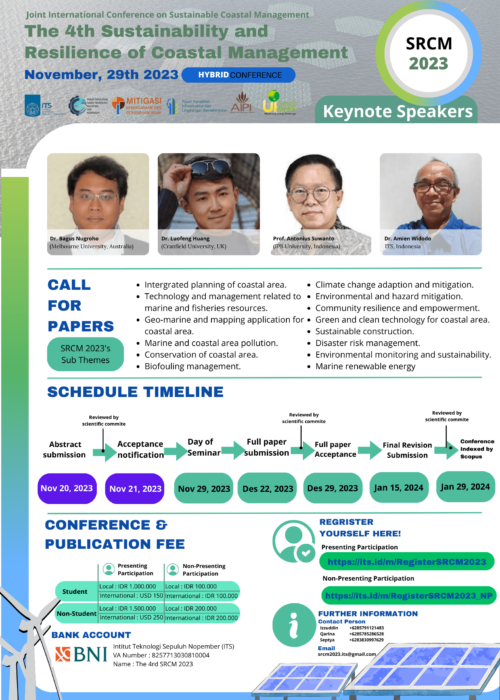
ITS then extends its global impact through partnerships in sustainable urban development, notably collaborating with KONE Corporation and BRAUIC through the Global Project-Based Learning (GPBL) program. This initiative addresses challenges in sustainable building innovation, including accessibility, robotics, energy efficiency, and safety. The 2023 GPBL program implemented five sustainability case studies, with outstanding teams recognized at the BRAUIC Conference.
The institution’s international cooperation is strengthened through a significant Memorandum of Understanding with BRAUIC, a consortium of 74 universities across more than 20 countries. Signed by ITS Rector Prof. Ashari, this partnership promotes student mobility and joint initiatives in architecture, civil engineering, and urban planning. Under BRAUIC Chairman Prof. Zhang Dayu’s leadership, the collaboration emphasizes research in environmental resilience and low-carbon solutions, particularly supporting Indonesia’s new capital development initiatives.
ITS Advances SDGs Through Strategic NGO Partnerships: From Urban Development to Educational Empowerment
ITS continues its ongoing efforts toward sustainable development through strategic collaborations with non-governmental organizations (NGOs), focusing on both urban development and social empowerment initiatives. These partnerships showcase how academic institutions can effectively contribute to multiple Sustainable Development Goals (SDGs) through practical, community-focused programs.
In a significant urban development initiative, ITS partnered with PMI Indonesia Chapter to organize the 2023 Project Management Challenge, centered on the theme “Bringing Smart Systems to the City.” This collaboration directly addressed sustainable cities and communities by engaging Indonesian students in developing smart city solutions across six crucial domains: Smart Mobility, Branding, Economy, Environment, Government, and Living. The three-day program exemplified practical learning through field studies across Surabaya, including visits to strategic locations such as Jalan Gubernur Suryo, Alun-alun Kota, and Balai Kota, where participants conducted hands-on observations and data collection to address real urban challenges.
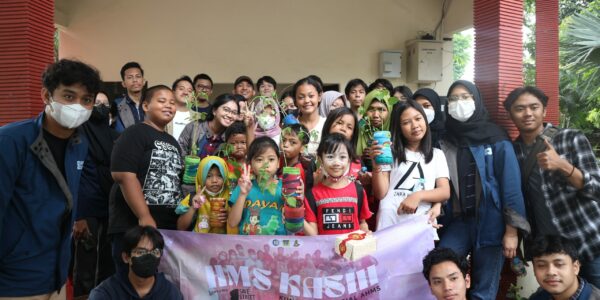
Simultaneously, ITS extends its commitment to sustainability through social empowerment initiatives, as demonstrated by the collaboration between the Civil Engineering Student Association (HMS) and Save Street Child (SSC) Surabaya. This partnership focuses on supporting marginalized children’s access to education and personal development, directly contributing to quality education and environmental awareness goals. Through the HMS Social Visit (Kasih) program, student volunteers created interactive learning experiences that combined environmental education with character development.
The program’s innovative approach included practical activities such as tree planting, which served the dual purpose of teaching environmental responsibility while providing hands-on learning experiences for the children. This activity was complemented by engaging question-and-answer sessions with rewards, designed to maintain the children’s interest in learning while building their understanding of environmental preservation.
Publication of SDG Reports
- Publication of SDG Report - SDG 1
- Publication of SDG Report - SDG 2
- Publication of SDG Report - SDG 3
- Publication of SDG Report - SDG 4
- Publication of SDG Report - SDG 5
- Publication of SDG Report - SDG 6
- Publication of SDG Report - SDG 7
- Publication of SDG Report - SDG 8
- Publication of SDG Report - SDG 9
- Publication of SDG Report - SDG 10
- Publication of SDG Report - SDG 11
- Publication of SDG Report - SDG 12
- Publication of SDG Report - SDG 13
- Publication of SDG Report - SDG 14
- Publication of SDG Report - SDG 15
- Publication of SDG Report - SDG 16
- Publication of SDG Report - SDG 17
Relationships to Support the Goals
Fostering Global Partnerships for Sustainable Development: ITS’ Approach to SDG 17 through Innovative Education and Engagement
ITS committed to shaping future leaders through a comprehensive approach to sustainable development education and engagement. ITS’ strategy integrates sustainability principles across three key areas: curriculum integration, international collaboration, and specialized SDG initiatives. The cornerstone of ITS’ approach is the mandatory Insights and Applications of Technology (IAT) course, implemented in the 2020-2023 curriculum. This course ensures all ITS students gain fundamental knowledge in sustainability concepts, Systems Theory, and the Sustainable Development Goals (SDGs), regardless of their field of study.
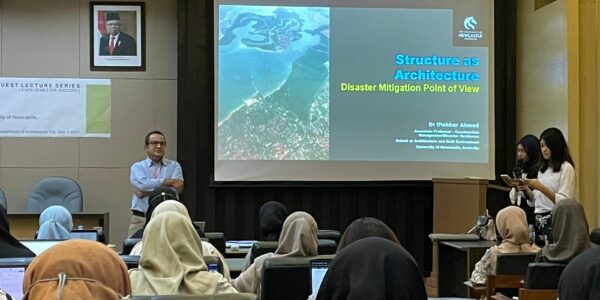
ITS’ International Engagement office enhances this foundation through strategic Guest Lecture Series (GLS) on SDGs:
- Specialized SDG Topic Sessions featuring expert speakers
- SDGs Festival lectures by international faculty covering SDGs 1-16
- Cross-cultural knowledge exchange promoting global perspectives
The ITS SDGs Study Center further strengthens ITS’ commitment through the “SDGs for You” series program, beginning with “Mainstreaming SDGs.” This initiative raises awareness about SDGs’ relevance across academic disciplines and future careers, targeting the entire student body.
ITS’ Dedicated Courses Addressing Sustainability and the SDGs
Institut Teknologi Sepuluh Nopember (ITS) has established a comprehensive educational framework focused on sustainability and the Sustainable Development Goals (SDGs), comprising several key educational components:
- Insights and Application Technology (IAT/Wastek) Course
- Mandatory course for all senior students across majors
- Focuses on technology, innovation, and SDG-based problem-solving
- Develops critical and systematic thinking for societal challenges
- Culminates in student-designed community service proposals aligned with their fields
- Demonstrates ITS’s commitment to meaningful SDG education
- Sustainable Development Course
- Specialized elective offered through Urban and Regional Planning department
- Focuses on sustainable resource management across three pillars: • Social sustainability • Economic sustainability • Environmental sustainability
- Covers key areas including: • Clean water management • Food agriculture • Urban and coastal carrying capacity • Sustainable development measurement tools • Integration in urban, regional, and coastal contexts
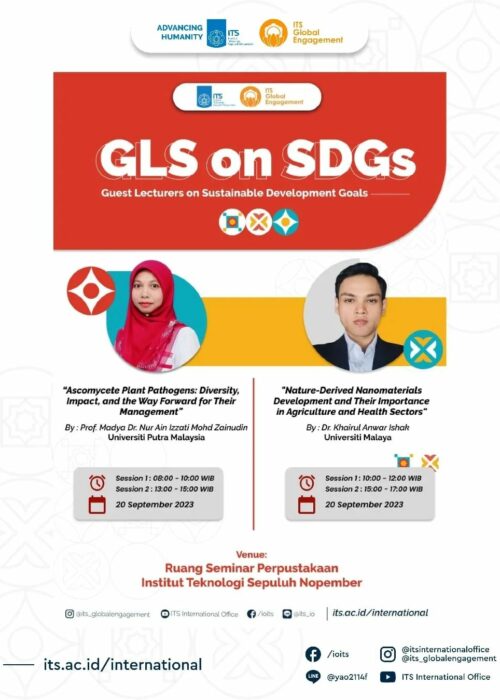
3. Guest Lecture Series (GLS) on SDGs
- Biannual program running since 2020 (spring and fall sessions)
- Features international experts, including: • Global academicians • Researchers • Professors • NGO representatives
- Integrated into department-based elective courses across all academic levels
- Open to public participation
- Provides platform for knowledge sharing and innovation in SDG implementation
4. ITS Center for SDGs Initiatives
- Established in 2020 to enhance ITS’s contribution to community service
- Key functions include: • Providing exposure to SDG principles • Facilitating networking opportunities • Conducting education and training programs • Supporting village sustainability and independence
- Notable collaboration with TV Desa Youtube channel: • Hosts regular webinars • Creates independent learning resources • Focuses on village empowerment • Promotes SDG literacy in local communities
This structured approach ensures comprehensive SDG education while maintaining field-specific relevance and promoting practical application through community engagement and empowerment programs. The framework demonstrates ITS’s commitment to integrating sustainable development principles across its educational offerings while extending impact beyond traditional academic boundaries.
ITS Advances Community Education Through Innovative Sustainable Development Programs
ITS has demonstrated its comprehensive commitment to sustainable development through innovative educational outreach programs that effectively engage diverse community groups. These initiatives showcase ITS’ dedication to combining technological advancement with accessible education, creating lasting impact across different demographic segments.
Two notable programs highlight ITS’s multifaceted approach to community education. The first initiative focuses on renewable energy education, led by Dr. Eng Rony Seto Wibowo ST MT, which successfully implemented a PV on-grid system while providing extensive community education. This program included the installation of a sophisticated 3kWp solar panel system at the Al Azhar Mosque in Surabaya’s Mulyosari district, serving as both a practical demonstration and a learning platform for the community. The implementation involved comprehensive workshops covering solar panel technology, maintenance procedures, and energy conservation practices, directly benefiting local residents and mosque administrators in the densely populated urban area.
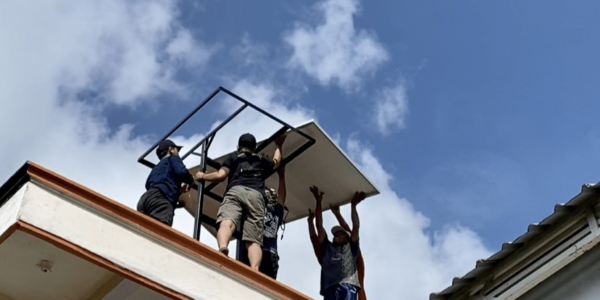
The second program, headed by Rabendra Yudistira Alamin ST MDs, addresses financial literacy through innovative gaming solutions, targeting various community segments. The “Tata Harta” board game was specifically designed to simulate real-world financial scenarios, incorporating elements of budgeting, investment, and risk management. The program has conducted numerous workshops and gaming sessions in one of East Java’s rural high school, SMKN 1 Mojokerto. These sessions have provided them with practical financial management skills through an engaging and interactive format.
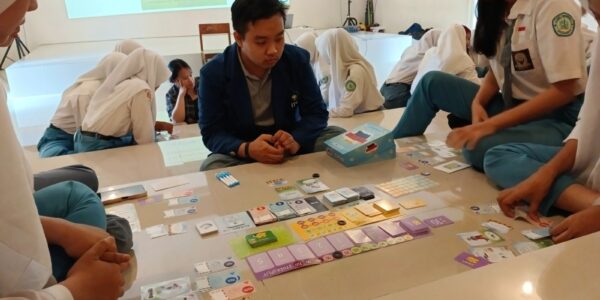
Both programs share a common strength in their inclusive educational approach, reaching beyond traditional academic boundaries to engage diverse community groups. The renewable energy program has effectively involved local residents in hands-on learning experiences, conducting regular training sessions at the Al Azhar Mosque community hall that cover both theoretical knowledge and practical skills. The mosque’s solar panel installation serves as a living laboratory, where community members from Mulyosari and surrounding neighborhoods can observe and learn about renewable energy systems in action. Meanwhile, the financial literacy initiative has created an accessible learning environment through its game-based approach, making complex financial concepts more approachable and understandable for participants of varying educational backgrounds.
The success of these programs lies in their participatory nature and practical application. The renewable energy workshops at Al Azhar Mosque provide technical training and maintenance knowledge, enabling participants to understand system monitoring, basic troubleshooting, and energy efficiency principles. The program has also established a sustainable maintenance system, where trained community members from the Mulyosari area take active roles in system upkeep and monitoring. The financial literacy program, through its innovative board game, has been complemented by guided discussions and practical exercises, helping participants develop concrete financial planning and decision-making skills.
Developing a Sustainability Literacy Assessment at ITS
At ITS, we are implementing a strategic approach to evaluate sustainability literacy across our academic community. Our assessment framework is designed to measure understanding, application, and critical thinking related to sustainability concepts through these key initiatives:
Global Best Practices Integration:
We have carefully studied leading sustainability assessment frameworks, particularly AASHE’s STARS program, to align our evaluation methods with international standards. This benchmarking extends to examining successful sustainability literacy tests from renowned institutions like Stanford University, University of Michigan, and UC Davis, as well as established platforms like Sulitest.Customized Assessment Structure
Our assessment tool combines two complementary evaluation methods:
- A 30-question multiple-choice section that measures fundamental understanding of sustainability principles, environmental systems, and social responsibility
- Six thought-provoking essay questions that challenge participants to demonstrate critical thinking and apply sustainability concepts to real-world scenarios
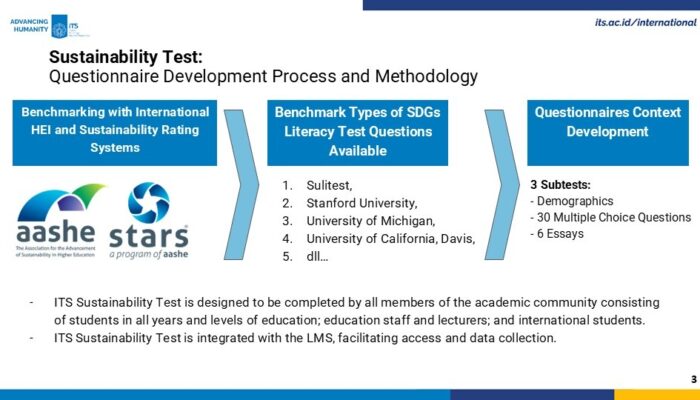
Context-Sensitive Design
The assessment is tailored to reflect both global sustainability challenges and local contexts, ensuring relevance to our campus community while maintaining international perspectives. This approach allows us to:
- Address region-specific sustainability challenges
- Incorporate cultural and social dimensions of sustainability
- Connect global sustainability goals with local actions
Inclusive Implementation
To ensure widespread accessibility and participation, we’ve integrated the assessment into our Learning Management System, making it available to:
- Students across all academic levels
- Faculty members and staff
- International students and visitors
This comprehensive approach allows us to effectively measure and track sustainability literacy while fostering a deeper understanding of sustainable development principles throughout our academic community.
